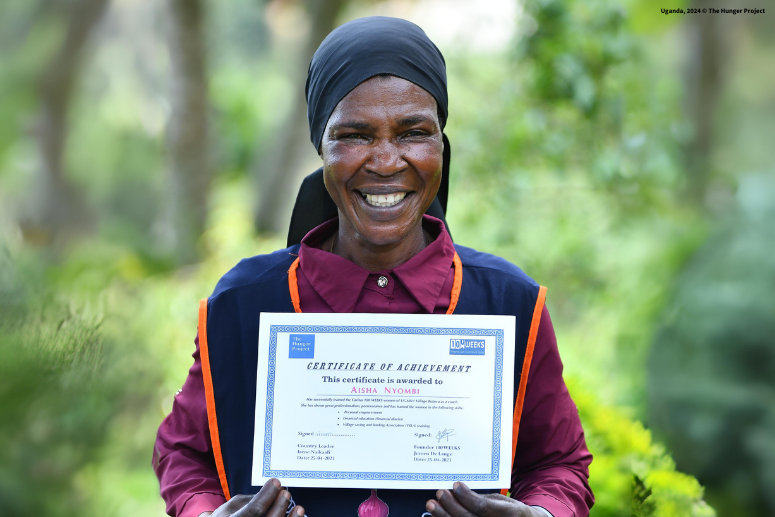Meet Aisha, an advocate for women’s empowerment in the Butambala District of Uganda.
As we commemorate International Women’s Day with the theme, “Invest in women: accelerate progress,” our focus turns to the inspiring Aisha Nyombi, a distinguished woman leader from Butambala district. Aisha’s leadership not only transforms the conventional norms within her community but also cultivates an environment where women are mobalized to assume roles as leaders and entrepreneurs. She stands as a key figure in The Hunger Project-Uganda‘s women empowerment initiatives.
In a recent conversation with her, we gained valuable insights into her journey as the catalyst behind the formation of 10 savings groups whose members have initiated innovative projects in their respective communities.
As a woman leader, what is your daily routine like?
Generally, my day involves related activities such as waking up, preparing meals for my family, and tending to my garden and business. This routine applies to other days of the week with the exception of Thursdays, my favourite day. Every Thursday afternoon, my compound comes alive with women from our community. Initially, I started with a few members in one saving group which has since expanded to 10 groups, each with around 15 women. The beauty is that these weekly meetings go beyond saving, as women, we also discuss leadership, mind-set change, primary healthcare, and business management skills among women.
What inspired you to start this initiative?
With nearly 20 years of active participation in The Hunger Project’s initiatives within my community, I have undergone a journey of transformation through their leadership programs. I have gained knowledge and awareness that I believe is crucial for any community’s growth. This, coupled by my passion for women empowerment has inspired me to assume the responsibility of creating a space where we share the knowledge acquired and support fellow women to uplift the entire community.
How has the savings groups impacted your community, particularly the women?
Our program has significantly altered the traditional conservative mind-set in Butambala, where women were primarily seen as homemakers. We have introduced the concept that women can achieve much more beyond their household duties. By addressing economic empowerment and providing access to credit, we have seen remarkable transformations.
Over 10 women have started various businesses, such as food vending, crafts making, and livestock farming. A standout example is Lamula Nanfuka, who received a business loan to venture into the matooke (banana) trade. Her success in this business enabled her to purchase land for her family and commence the construction of a permanent house.
Personally, I am a savings coach leading a total of 20 members. There are other leadership opportunities especially on the Executive Committee that consists of a Chairperson, Secretary, Treasurer and signatories. All these have been taken up by women members who have well-defined roles for the smooth running of the group.
Have there been any noticeable changes in domestic dynamics as a result of women's economic empowerment?
Absolutely! Many women in our group have shared how economic empowerment has led to a decrease in domestic violence. When a woman is financially independent, it not only reduces the financial strain on the family but also changes the dynamics with their partners, often leading to a more respectful relationship.
Apart from financial savings, what other activities do you engage in?
My home also serves as a skills center where over 30 young girls and women learn various handcraft skills, like knitting, making clothes, and creating artefacts such as baskets and mats. During the COVID-19 pandemic, we started making locally produced face masks, which became a significant source of income for us.
How does the group manage the earnings from the items sold?
On average, each member saves about UGX 20,000 weekly. After 13 weeks, we assess our total savings and the interest earned from loans. A portion of this collective amount is then allocated as capital for members to either start or enhance their businesses. Whenever we make a sale, we allocate a percentage of the earnings for savings and investments, while the rest goes to the woman who created the sold item.
This system not only encourages savings but also motivates members to invest in their personal and business growth. The earnings vary significantly among members, primarily influenced by their savings discipline and the nature of the skills they have acquired.
Loans are only given to internal group members with varying interests for each. A loan runs for three months and the highest amount loaned depends on how much an individual has saved multiplied by three. Based on this, there is no fixed estimate, but the income potential is directly tied to the individual’s commitment and savings habits.
Have you faced any challenges and how are they handling them?
The journey of empowering women is transformative not just for the individuals but for the entire community. It is about changing mind-set, creating opportunities, and building a supportive network that believes in the potential of every woman. Aisha’s story and the stories of the women in our groups are testaments to what can be achieved when we invest in women’s growth and leadership.
How You Can Invest In Women.
Our programs build and strengthen leadership skills, advocate for active citizenship and mobilize communities to raise awareness on crucial issues. Join us in creating an environment that supports the holistic development of women.
Follow our social channels to learn more about our work with incredible women around the world.
Image: Aisha from Uganda, 2024 © The Hunger Project

